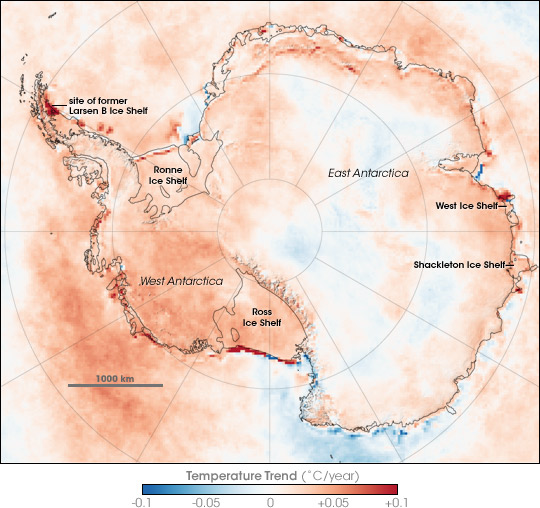Watched the video, and I can't say I find those rebuttals of climate change all that impressive.
1. Temperature has changed only 0.8 degrees in 100 years. That's not much.
So +0.8K in 100 years is MASSIVE. His argument seems to be partly based around the fact that the number 0.8 sounds small, which I find incredible. Average global temperature has changed by only 0.5 degrees since the end of the last ice age!
This is an unprecedented change in Earth's history. Also a change in CO2 concentration of ~50ppm is huge. It has risen by around 30% in just 150 years. Think of that. We've dumped enough CO2 to change an amount of CO2 that had been stable for MILLIONS of years by 30%.
See that tiny steep rise at the very end of the CO2 curve? See how it's preceded by several million years of absolute flatness? It is a logarithmic scale, so we've increased the levels in 100 years to match those of 5 million years ago. It is the largest slope on the curve, despite the fact that as you go further back in time, time gets more and more compressed on the graph.
2. You can't even measure such small variations in average temperature!
Of course you can. Below is a link that shows that increase in average temperature pops up regardless of the method used. I'm gonna ignore the fact that if you really didn't think global temperature can be measured, you wouldn't have bothered dismissing the smallness of 0.8K.
https://www.skepticalscience.com/surface-temperature-measurements-advanced.htm
From the page, here's the graph that shows LAND ONLY temps, since he suggested a conspiratorial reason for the fact that ocean temperature is now used along with land temp to calculate averages. You know, instead of the fact that the ocean covers most of the Earth and plays a huge role in governing the climate.
3. And who is to say what is optimal anyway?
There is no such thing as optimal. There is only the incidental conditions that we find ourselves in. Those are the conditions that the current biosphere finds itself in, and the one humans built their civilization around. Had we lived in the Triassic, sea level would have been hundreds of feet above current levels, and we would have strove to keep it that way. What matters is that changes that used to take millions of years to occur are now happening over decades due to human activity. There is no way evolutionary mechanisms are capable of adapting to such rapid changes, and global climate change will undoubtedly cause a mass extinction event.
Human civilization has also been built around current conditions. Changing climate means some previously fertile areas will no longer be commercially viable. Previously habitable areas will be submerged. Any change in ocean current would have SERIOUS effects on global weather, and would disrupt the lives of billions. Compare the difference in climate between Alaska and Norway (similar latitude, different ocean current). What is Scandinavia suddenly shifts to the barely livable Alaskan climate?
It would also mean, of course, that some areas will become more fertile, and other areas will become prime ocean-front real estate. But adapting to this new reality will be costly.
4. Even though temperature has risen over the past 100 years, life is better than ever.
Not really relevant. The Earth has a certain capacity to "absorb" the immediate effects of rapid change, but we know for a fact that conditions throughout Earth's history had been very different than conditions today. Our current conditions are "optimal" for us since we evolved around them. Any change will come with an environmental and human cost.
I don't want to spend my night debating climate change, but there are vast number of resources on the internet for those seeking an education on the subject. And the science shows that the temperature is increasing, that it is increasing due to human activities, and that there will be consequences to the increase.
The debate should not be about whether the planet is warming. We already know it is. It should be about the extent to which it is warming, the precise mechanisms causing and mitigating the change in climate, the period over which the changes will unfold, the details of this unfolding, and the best ways to tackle the effects of climate change in the short and long run.





